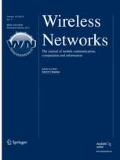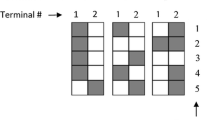Abstract
A technical challenge in successful deployment and utilization of wireless multihop networks (WMN) are to make effective use of the limited channel bandwidth. One method to solve this challenge is broadcast scheduling of channel usage by the way of time division multiple access (TDMA). Three evolutionary algorithms, namely genetic algorithm (GA), immune genetic algorithm (IGA) and memetic algorithm (MA) are used in this study to solve broadcast scheduling for TDMA in WMN. The aim is to minimize the TDMA cycle length and maximize the node transmissions with reduced computation time. In comparison to GA and IGA, MA actively aim on improving the solutions and is explicitly concerned in exploiting all available knowledge about the problem. The simulation results on numerous problem instances confirm that MA significantly outperforms several heuristic and evolutionary algorithms by solving well-known benchmark problem in terms of solution quality, which also demonstrates the effectiveness of MA in efficient use of channel bandwidth.







Similar content being viewed by others
References
Lloyd, E. L. (2002). Broadcast scheduling for TDMA in wireless multihop networks. In Handbook of wireless networks and mobile computing (pp. 347–370). New York: Wiley.
Ephremides, A., & Truong, T. V. (1990). Scheduling broadcasts in multiple radio networks. IEEE Transactions on Communications, 38(4), 456–460.
Wang, G., & Ansari, N. (1997). Optimal broadcast scheduling in packet radio networks using mean filed annealing. IEEE Journal on Selected Areas in Communications, 15(2), 250–260.
Ju, J., & Li, V. O. K. (1998). An optimal topology-transparent scheduling method in multihop packet radio networks. IEEE/ACM Transactions Networking, 6(3), 298–306.
Wang, C.-Y., Atkinson, M. W., Fertig, K. W., & Sastry, A. R. K. (1986). Performance evaluation of multi-hop packet radio networks using simulation. In MILCOM ‘86—Military Communications Conference, Monterey, CA, October 1986, pp. 28.5.1–28.5.6.
Funabiki, N., & Takefuji, Y. (1993). A parallel algorithm for broadcast scheduling problems in packet radio networks. IEEE Transactions on Communications, 41(6), 828–831.
Goutam, C., & Hirano, Y. (1998). Genetic algorithm for broadcast scheduling in packet radio networks. In Proceedings of IEEE World Congress Computational Intelligence, Anchorage, AK, May 1998, pp. 183–188.
Salcedo-Sanz, S., Bousono-Calzon, C., & Figueiras-Vidal, A. R. (2003). A mixed neural-genetic algorithm for the broadcast scheduling problem. IEEE Transactions on Wireless Communications, 2(2), 277–283.
Ngo, C. Y., & Li, V. O. K. (2003). Centralized broadcast scheduling in packet radio networks via genetic-fix algorithms. IEEE Transactions on Communications, 51(9), 1439–1441.
Peng, Y., Soong, B. H., & Wang, L. (2004). Broadcast scheduling in packet radio networks using mixed tabu-greedy algorithm. Electronics Letters, 40(6), 375–376.
Shi, H., & Wang, L. (2005). Broadcast scheduling in wireless multihop networks using a neural-network-based hybrid algorithm. Neural Networks, 18, 765–771.
Chakraborty, G. (2004). Genetic Algorithm to solve optimum TDMA transmission schedule in broadcast packet radio networks. IEEE Transactions on Communications, 52(5), 765–777.
Wu, X., Sharif, B. S., Hinton, O. P., & Tsimenidis, C. C. (2005). Solving optimum TDMA broadcast scheduling in mobile ad hoc networks: A competent permutation genetic algorithm approach. IEE Proceedings: Communications, 152(6), 780–788.
Ahmad, I., Al-Kazemi, B., & Das, A. S. (2008). An efficient algorithm to find broadcast schedule in ad hoc TDMA networks. Journal of Computer Systems, Networks, and Communications, 12, 1–10.
Sun, M., Zhao, L., Cao, W., Xu, Y., Dai, X., & Wang, X. (2010). Novel hysteretic noisy chaotic neural network for broadcast scheduling problems in packet radio networks. IEEE Transactions on Neural Networks, 21(9), 1422–1433.
Chakrabortya, G., Chakraborty, D., & Shiratori, N. (2005). A heuristic algorithm for optimum transmission schedule in broadcast packet radio networks. Computer Communications, 28, 74–85.
Gunasekaran, R., Siddharth, S., Krishnaraj, P., Kalaiarasan, M., & Rhymend Uthariaraj, V. (2010). Efficient algorithms to solve broadcast scheduling problem in WiMAX mesh networks. Computer Communications, 33, 1325–1333.
Ramanathan, S., & Lloyd, E. L. (1993). Scheduling algorithms for multihop radio networks. IEEE/ACM Transactions on Networking, 1(2), 166–177.
Yeo, J., Lee, H., & Kim, S. (2002). An efficient broadcast scheduling algorithm for TDMA ad-hoc networks. Computers & Operations Research, 29(13), 1793–1806.
Bi, W., Tang, Z., Wang, J., & Cao, Q. (2005). An improved neural network algorithm for broadcast scheduling problem in packet radio. Neural Information Processing-Letters and Reviews, 9(1), 23–29.
Menon, S. (2009). A sequential approach for optimal broadcast scheduling in packet radio networks. IEEE Transactions on Communications, 57(3), 764–770.
Wang, L., & Shi, H. (2006). A gradual noisy chaotic neural network for solving the broadcast schedule problem in packet radio networks. IEEE Transactions on Neural Networks, 17(4), 989–1000.
Oki, E., & Iwaki, A. (2010). Load-balanced IP routing scheme based on shortest paths in hose model. IEEE Transactions on Communications, 58(7), 2088–2096.
Wang, L., Liu, W., & Shi, H. (2009). Delay-constrained multicast routing using the noisy chaotic neural networks. IEEE Transactions on Computers, 58(1), 82–89.
Sinanoglu, O., Karaata, M. H., & Albdaiwi, B. (2010). An inherently stabilizing algorithm for node-to-node routing over all shortest node-disjoint paths in hypercube networks. IEEE Transactions on Computers, 59(7), 995–999.
Michalewicz, Z. (1995). Genetic algorithms + data structure = evolution programs. New York: Springer.
De Jong, K. A., & Spears, W. M. (1989). Using genetic algorithms to solve NP-complete problems. In Proceedings of the 3rd International Conference on Genetic Algorithms (pp. 124–132).
Banos, R., Gil, C., Reca, J., & Montoya, F. G. (2010). A memetic algorithm applied to the design of water distribution networks. Applied Soft Computing, 10, 261–266.
Krasnogor, N., & Gustafson, S. (2002). Toward truly memetic algorithms: Discussion and proof of concepts. In Proceedings of PPSN VII.
Moscato, P. (1999). Memetic algorithms: A short introduction new ideas in optimization (pp. 219–234). New York: McGraw-Hill.
Lu, Z., & Hao, J. K. (2010). A memetic algorithm for graph coloring. European Journal of Operational Research, 203, 241–250.
Liu, M., Pang, W., Wang, K. P., Song, Y. Z., & Zhou, C. G. (2006). Improved immune genetic algorithm for solving flow shop scheduling problem. In Computational methods (pp. 1057–1062). Springer.
Jiao, L., & Wang, L. (2000). A novel genetic algorithm based on immunity. IEEE Transactions on Systems, Man, and Cybernetics—Part A: Systems And Humans, 30(5), 552–561.
Wang, D., Fung, R. Y. K., & Ip, W. H. (2009). An immune-genetic algorithm for introduction planning of new products. Computers & Industrial Engineering, 56, 902–917.
Acknowledgments
We gratefully acknowledge Department of Science and Technology, INDIA for providing financial support to carry out this research work under PURSE scheme. We would like to thank sincerely the Editor and the Reviewers for their constructive comments and suggestions that helped to improve the manuscript significantly.
Author information
Authors and Affiliations
Corresponding author
Rights and permissions
About this article
Cite this article
Arivudainambi, D., Rekha, D. An evolutionary algorithm for broadcast scheduling in wireless multihop networks. Wireless Netw 18, 787–798 (2012). https://doi.org/10.1007/s11276-012-0433-4
Published:
Issue Date:
DOI: https://doi.org/10.1007/s11276-012-0433-4




